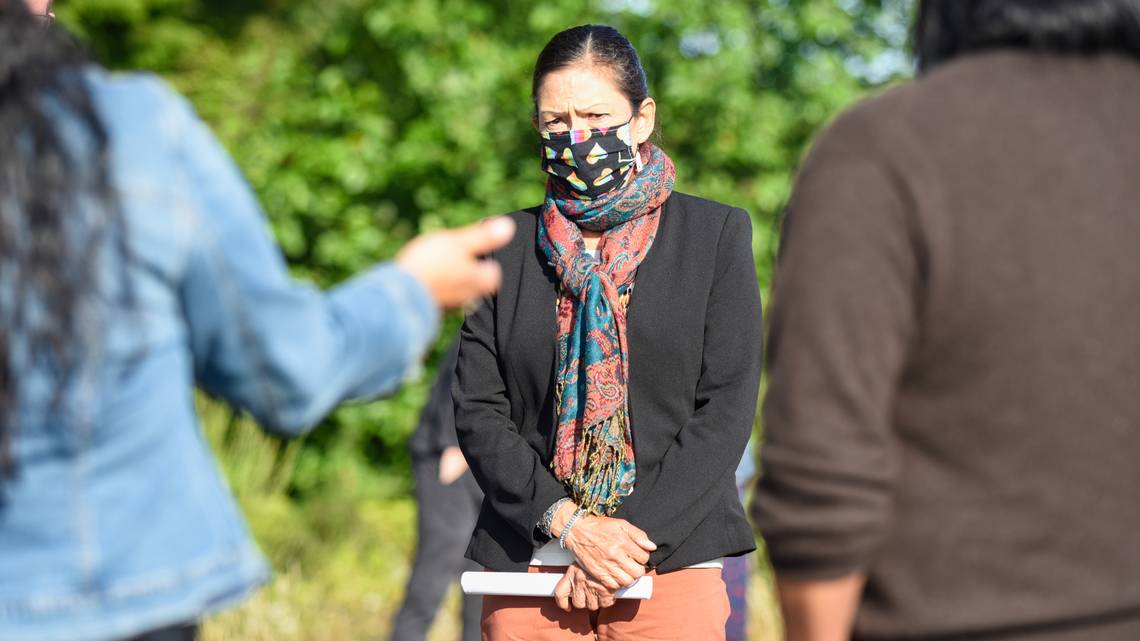
- Details
- By Jenna Kunze
The federal government is set to make good on its trust responsibility by paying for the climate-change caused relocation of three coastal tribes in Western Washington.
Last week, the House approved a nearly $3.6 million funding package for the Hoh Tribe, Quileute Tribe, and Quinault Indian Nation to relocate to higher ground.
The relocation funding, introduced by U.S. Representative Derek Kilmer (WA-06), must now pass the Senate and be signed into law by the president.
Want more Native News? Get the free daily newsletter today.
If approved, the Hoh Tribe would receive $1.7 million to build out essential infrastructure and bring sufficient electrical infrastructure to each commercial, governmental, and residential lot, according to Kilmer’s summary. Additionally, it would pay to connect the tribe’s existing water and sewer lines to a relocated reservation area.
The Quileute Tribe would receive close to $1.5 million in funding to help them finish developing a reliable water source as they move their communities to higher ground to escape tsunami risk.
The Quinault Indian Nation’s relocation would get half a million dollars to relocate 70 families in their village currently within risk of the tsunami zone.
“Climate change and rising sea levels are threatening coastal communities across our region – including the homelands of several of our region’s tribes,” Rep. Kilmer said in a statement. “The federal government has an obligation to fulfill its trust and treaty responsibilities and to make sure that people aren’t put at risk. It’s a big deal that this funding for the Quinault Indian Nation, the Quileute Tribe, and the Hoh Tribe, has passed the House. I’ll keep pushing to ensure these tribal communities get the support they need as they seek to move to higher ground and keep their people out of harm’s way.”
Quinault Indian Nation President Guy Capoeman, said that the tribe has decided it must relocate Taholah Village to higher ground due to threat of increased storm surge, continued riverine flooding, and tsunami threat.
“When we see that ocean breach up to our only store, our community center, our jailhouse, our courthouse — every one of these is a reminder that we are in harm’s way… We have a duty to protect our community,” Fawn Sharp, vice president of the Quinault Indian Nation and president of the National Congress of American Indians previously told The News Tribune.
This past August, Department of the Interior secretary Deb Haaland visited the Quinault Indian Nation. During the address, she highlighted the bipartisan infrastructure deal’s $216 million allocation to tribal communities for climate resilience, adaptation and community relocation.
“It’s pretty clear and it’s pretty easy to see … why we need to take action and why we need to do everything we can to protect these beautiful areas,” Haaland said. “For the sake of nature, but also because people have lived here for thousands of years and they deserve to have their homeland preserved. They deserve to know that in the future their grandchildren can rely on a place that is their ancestral homeland.”
More Stories Like This
Gwich'in Tribal Governments Submit Comments Challenging Fish and Wildlife Service's Inadequate Environmental Review of Arctic Refuge Snow RoadRappahannock Tribe Challenges 9M-Gallon Water Plan
Feds release draft long-term plans for Colorado River management
Apache Leader Walks 60 Miles to Court Hearing That Will Decide Fate of Sacred Oak Flat
Rappahannock Tribe Raises Sovereignty and Environmental Concerns Over Caroline County Water Permit
Help us defend tribal sovereignty.
At Native News Online, our mission is rooted in telling the stories that strengthen sovereignty and uplift Indigenous voices — not just at year’s end, but every single day.
Because of your generosity last year, we were able to keep our reporters on the ground in tribal communities, at national gatherings and in the halls of Congress — covering the issues that matter most to Indian Country: sovereignty, culture, education, health and economic opportunity.
That support sustained us through a tough year in 2025. Now, as we look to the year ahead, we need your help right now to ensure warrior journalism remains strong — reporting that defends tribal sovereignty, amplifies Native truth, and holds power accountable.
 The stakes couldn't be higher. Your support keeps Native voices heard, Native stories told and Native sovereignty defended.
The stakes couldn't be higher. Your support keeps Native voices heard, Native stories told and Native sovereignty defended.
Stand with Warrior Journalism today.
Levi Rickert (Potawatomi), Editor & Publisher

